Experimental writing styles in poetic texts not only belong to the central procedures of modern literature, but are likewise also interfaces with the literature of Central Europe, which can hardly be comprehended in terms of national or geographical contextualization. Regarding the background of the expansion of European perspectives, the variety of experimental poesy is reconsidered in its contexts and political implications. The various kinds of experimental lyrics thereby come into focus, e.g., concrete poetry, but also other avant-garde trends up to surrealistic writing styles. Thereby besides German-language literature, there is also a focus on the expressions of experimental poetry in various countries and cultures of Central Europe. With regard to the relationships between the texts and their contexts, but also with regard to their materiality and spatiality, in the present volume access will be found to the complex interrelationships of experimental writing styles.


